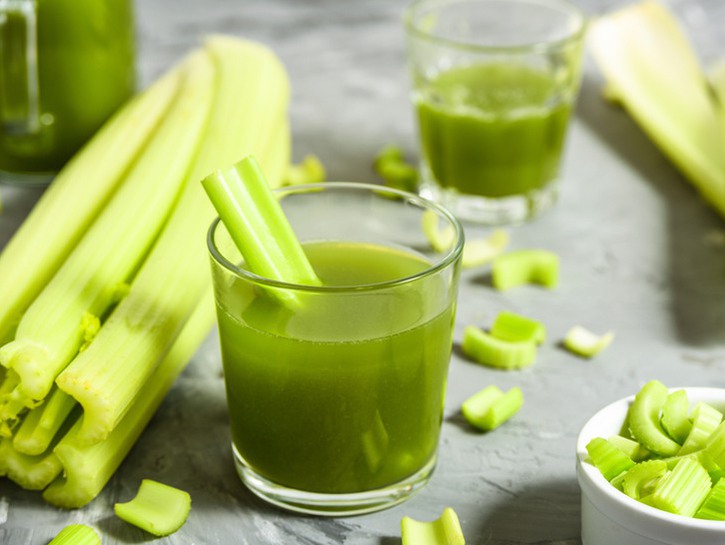What Is Celery Juice?
It doesn’t take rocket science to figure out that celery juice is simply just juiced celery. However, you’ve probably seen celebrities and influencers sipping on the juice on your Instagram feed, saying that it’s cured their every ailment and has changed their life for the better. If all these influencers are saying it’s the cure all that completely changed their health for the better, it must be true, right? Well…we’ll get into that, but first, let’s talk about how this trend got started.
Why Did Celery Juice Become Popular?
You may have noticed that celebrities and influencers have been boasting about the benefits of drinking celery juice all over social media, but how did this trend get so popular in the first place? Well, you can thank Anthony William for that.
Despite not having a legitimate background in healthcare, William has built career as a “medical medium” and has written books on the medical healing powers of celery juice. According to his website, William allegedly has the psychic ability to “read people’s conditions and tell them how to recover from their health” and has been able to do so since he was a child.
Here’s a rundown of William’s message about the “healing powers” of celery juice:
- William claims drinking 16 oz of celery juice on an empty stomach every day will help you experience less digestive problems, get rid of acid reflux, get rid of brain fog, and feel more energized.
- Celery juice is changing the lives of millions by reversing and reducing their symptoms and conditions. It should be noted that William rarely specifies what symptoms and conditions are being reversed because apparently celery juice will cure anything that you’re dealing with.
- People who suffer from chronic illnesses that all are able to “get relief by juicing this humble herb.”
- Juicing celery extracts something William calls “sodium cluster salts,” which is apparently an undiscovered sub-group of sodium that kills off pathogens that are responsible for “symptoms and conditions.”
If William’s claims seem far-fetched to you, it’s because they are. Not only are his claims not backed by peer-reviewed research, but he rejects the scientific community as a whole and says that people whose lives have been “changed” by drinking celery juice are being silenced.
You’d think that William’s lack of credentials alone would make people skeptical of his claims, but I guess it’s pretty easy to be duped by a guy who says that says celery juice is a medical miracle when celebrities are hopping on board his hype train.
From Pharrell Williams to Gwyneth Paltrow to Robert De Niro, celebrities of all kinds have bought into William’s movement. And as long as high status celebs keep posting their green juices all over their social media, the rest of the masses will follow. This means that the celery juice movement will probably maintain some relevance in the public eye…at least until the next health fad comes along.

The Real Benefits Of Celery And Celery Juice
Since William isn’t actually a scientist, nor are his claims backed by any type of credible academic research, we really can’t say whether or not there’s any truth to his “teachings” about celery juice. However, here’s what we do know.
Benefits Of Celery
Celery, by itself, does contain some health benefits, but they may not be as life-changing or medicinal as you think. One stalk of celery contains very little calories or carbs and is a good source of fiber. Celery also contains a ton of nutrients, like vitamin A, vitamin C, vitamin K, folate, calcium, potassium, sodium, magnesium, and phosphorus. Celery’s fiber content helps the body lower cholesterol and aids in the digestive system, while the nutrients found in celery helps lower blood pressure and relieve inflammation.
Benefits Of Celery Juice
Just like plain sticks of celery, celery juice contains the following: vitamin A, vitamin C, vitamin K, folate, calcium, potassium, sodium, magnesium, phosphorus, electrolytes, and water.
It’s important to note, however, that juicing strips away a lot of the fiber naturally found in celery. Fiber helps with feeling full, igniting weight loss, and balancing blood sugar, so continuing to juice celery in lieu of eating it probably won’t help you out in the long run. By juicing celery, you miss out on all the nutrients that come from the peel and pulp. Additionally, celery juice contains more sugar than plain celery because juicing any type of fruit or vegetable makes the sugar content more concentrated.

Is Celery Juice Legit Or Is This Trendy Drink Just A Scam?
Celery juice is by no means bad for you. It contains a ton of electrolytes that help keep you hydrated throughout the day. Plus, the phytochemicals found in celery can help ease inflammation and reduce blood pressure. However, you get those benefits when eating celery whole, plus the added benefits from fiber.
Another thing to consider is that most people are buying celery juice at the store instead of juicing it at home and buying organic celery juice every day isn’t cheap. If you do the math, assuming that you buy this celery juice from Whole Foods every day for $4.99, you’d spend $1,821.35 a year just on celery juice, and that’s not including tax.
At the end of the day, if you really want to have celery as a regular part of your diet, you’re better of just eating it plain as a snack. You’ll receive more of celery’s nutrients and benefits by eating it than drinking it.
